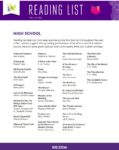Many teachers place their students into different reading level groups, which the kids tend to stay in for the rest of the year. Kids who score high in reading are grouped together, while those who score lower are placed in separate groups and given less challenging books to read.
Ability Groups for Reading: A Time-Honored Practice
In 2013, the Brookings Institution published an article titled “The Resurgence of Ability Grouping and Persistence of Tracking,” which provided a timeline of the popularity of school reading-level groups. According to the article: In the 1960s, about 80 percent of elementary schools grouped students by ability for reading instruction. (Students were usually organized into high-, middle-, and low-performing groups.)
By the mid-1990s, pre-K through fifth-grade teachers were surveyed about the practice. Only 27 percent of teachers reported using ability grouping to teach reading. Then, in 2006, 63 percent of first- through third-grade teachers surveyed about the practice said they did use ability grouping to teach reading, primarily because “it helps them meet students’ needs.” However, the teachers surveyed also expressed concern about the quality of instruction in low-ability groups. (About 20 percent of teachers noted that district or school policy prevented ability grouping.) By 2015, more than 90 percent of teachers reported using reading groups.
Now, some experts are saying that reading groups are more harmful than helpful.
Has the Reading Circle Come Full Circle?
A recent study conducted by the American Educational Research Association (AERA) called into question the effectiveness—and fairness—of using ability-based groups to teach reading. The study looked at 12,000 kindergartners through third-graders who either were instructed in a high-, middle-, or low-level reading group or in a general, ungrouped reading class.
About half of kindergartners in the lowest reading groups improved to at least the mid-level group by the end of first grade. Forty six percent of students who had been in the lowest second-grade reading group had moved up to the mid-level group by the end of third grade.
However, none of the students in the lowest kindergarten reading group ever caught up to the reading level of classmates from the highest kindergarten reading group.
Do Reading Groups Negatively Affect Some Kids?
According to the study, students assigned to high-level reading groups in an earlier grade were rarely demoted to lower groups. Students in lower reading groups progressed more slowly and were less likely to develop characteristics of successful learners such as concentration and persistence. As such, they were less likely to be promoted to higher reading groups.
The study’s author also suggests that the initial group a student is placed in, which seems to set the course for their future performance, may be subject to teacher bias: intentional or subconscious. Low-income students are more likely to be assigned to lower-level reading groups, while their wealthier peers are more likely to be tapped for higher-level reading groups.
That conclusion is echoed by another study published in the Society for Personality and Social Psychology. Researchers gave a group of teachers a list of student profiles including actual test scores and backgrounds that had been altered to suggest they were either high- or low-income. The conclusion? Teachers were more likely to refer lower-income students to a lower academic track and higher-income students to a more challenging track, even when their test scores were the same.
Expectation Becomes Reality
On the surface, ability-based reading groups seem to make sense from an efficiency standpoint. Unfortunately, research indicates they’re unfairly limiting to the most vulnerable students. What do you think? Is your student assigned to a classroom reading group? If so, has there been any fluidity in the group? How has it affected your child?
If reading level groups or other school practices are preventing your child from reaching his or her full academic potential, consider an online learning alternative. Visit K12.com to learn more and find a virtual school in your area.




































